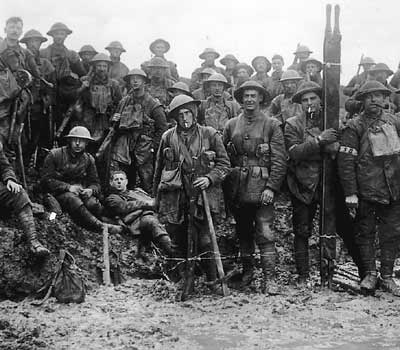

|
|
| |||||||||||||||||||||||||||||||||||||||||||||

Dulce
Et Decorum Est
| ||||||||||||||||||||||||||||||||||||||||||||||
|
Bent double, like old beggars under sacks, Knock-kneed, coughing like hags, we cursed through sludge, Till on the haunting flares we turned our backs, And towards our distant rest began to trudge. Men marched asleep. Many had lost their boots, But limped on, blood-shod. All went lame, all blind; Drunk with fatigue; deaf even to the hoots* Of gas-shells dropping softly behind.
Gas! GAS! Quick, boys!An ecstasy of fumbling, Fitting the clumsy helmets just in time, But someone still was yelling out and stumbling And flound'ring like a man in fire or lime. Dim through the misty panes and thick green light, As under a green sea, I saw him drowning.
In all my dreams before my helpless sight He plunges at me, guttering, choking, drowning.
If in some smothering dreams, you too could pace Behind the wagon that we flung him in, And watch the white eyes writhing in his face, His hanging face, like a devil's sick of sin, If you could hear, at every jolt, the blood Come gargling from the froth-corrupted lungs Bitter as the cud Of vile, incurable sores on innocent tongues, My friend, you would not tell with such high zest To children ardent for some desperate glory, The old lie: Dulce et decorum est Pro patria mori.
*NOTE: HootTo blow a horn or whistle; toot. To hoot was to broadcast an alarm for a gas attack. |
Dulce Et Decorum Est ranks among the great antiwar poems. Owen was inspired to write the poem after witnessing the gruesome death of a World War I soldier who had inhaled mustard gas.
Owen's title is ironic. It is taken from the line in Epodes by
Horace,
dulce et decorum est... (It is sweet and becoming
(honorable) to die for one's country). For his part, Horace was inspired by Homer's Iliad (line 496), which
reads, It is not unseemly for a man to die fighting in defense of
his country.
A grudging belief in a glorious death was an accepted part of society in ancient Greece, where you had to fight to survive. By the time of Ancient Rome, belief in the glory of war was genuinely felt by many, but not by all Roman citizens. Horace knew that Homer was well known to the Roman citizenry; he used Homer as propaganda to convince the holdouts that death in war in defense of one's country was not only necessary, it was noble and virtuous.
Owen was a well-educated British officer who served at the front in WWI, where he suffered a nervous breakdown. Having experienced the tragedy of bloody trench warfare, he had no sympathy with Horace. He wrote the poem to convince others that the Roman was wrong and he was right. When it came his turn, Owen employed Horace's line as a device to help him blast what he saw as the stupidity of war.
Owen's audience was the powerful cultivated and educated elite of the English upper classes, most of whom favored the war and thought it glorious. Owen knew this; he targeted this audience because it had the ability to end hostilities.
Owen realized that the upper crust would have read Horace in the original Latin at school; they would have understood the Latin title and recognized its connection with the classics. He also knew that a formal education was as close as many of them had ever come to a battle. For many, reading Horace was the origin of their belief that dying for England was a good idea. Owen set out to shatter this notion.
Owen chose the title because, to the elite, it would have suggested a favored idea; the title itself would encourage them to read the poem. By the last line, however, he knew they would have had no doubt as to the poem's real purpose.
Repeating the line at the end of the poem is a stroke of genius. There is nothing glorious about drowning in your own blood. It is an ironic twist that drives home the poet's point.
Owen returned to the front lines and died tragically a week before the end of the war he despised.
See Electricka's biography of Wilfred Own in her Lives In The Arts page: click here.
See a translation of Owen's title and Horace's Latin. Find it for yourself at The Muse Of Language Arts' Table Of Latinisms: click here.
...Coming.
Search this web site with Electricka's Search Tool:
tap or click here
Electricka's Theme Products
Shop At Cafe Press
This web site and
its contents are copyrighted by
Decision Consulting Incorporated (DCI).
All rights reserved.
Contact Us
Print This Page
Add
This Page To Your Favorites (type <Ctrl> D)


You may reproduce this page for your personal
use or for non-commercial distribution. All copies must include this
copyright statement.
Additional
copyright and trademark notices
| Exploring the Arts Foundation |
 |
| Today's Special Feature |
| Search Now |
| To Do |
| Related Pages |
| See Also |
| ETAF-Amazon |